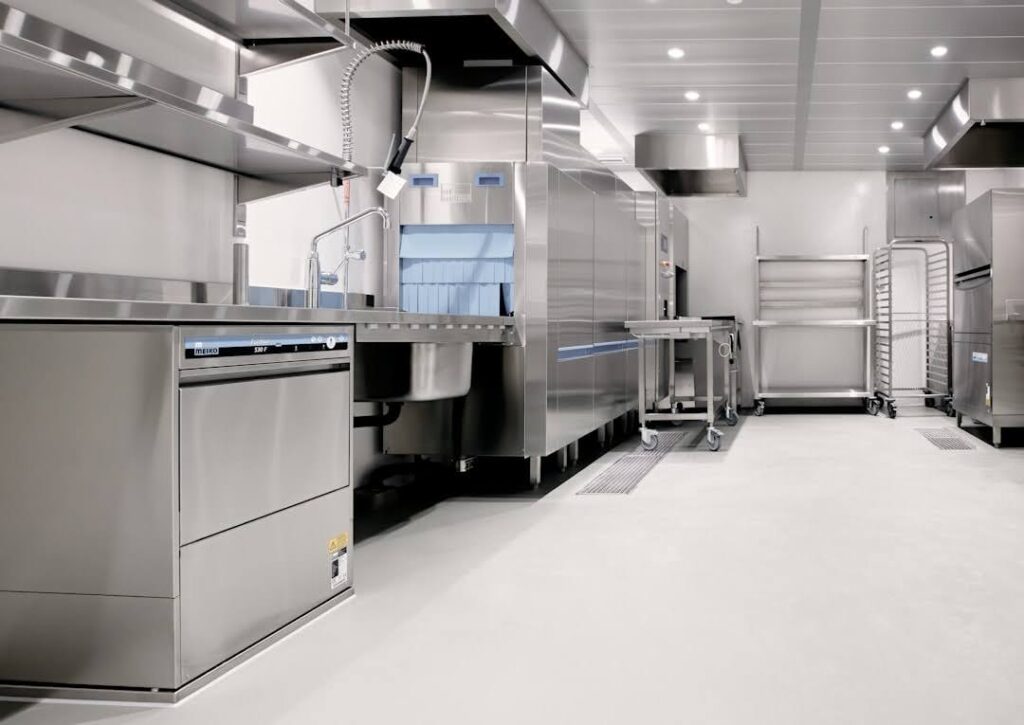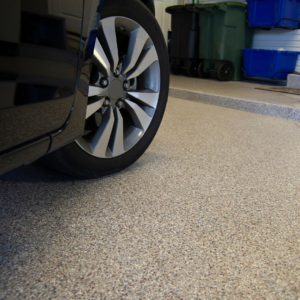
Enhance your space in Florida with tropical epoxy floor solutions
Discover how Elitecrete’s garage epoxy flooring transforms Florida homes and businesses with durability, aesthetics, &

April 18, 2024

Epoxy floors are often chosen for their durability and appearance, making them popular in both homes and businesses. But, these floors can face challenges under high temperatures and humidity. Understanding how these environmental factors affect the performance of epoxy-coated floors is crucial for anyone considering this flooring option.
In a hot and humid environment, epoxy floors undergo various reactions because of their sensitivity to heat and humidity. These reactions can influence the curing process, the floor’s final appearance, and its durability.
This blog aims to provide valuable insights to help ensure that your flooring remains robust and attractive over time. Continue reading to explore the effects of heat and humidity on epoxy floors.
Epoxy is a type of durable flooring made from a special mix of materials. It consists of two main components: resins and hardeners. When these two substances are mixed, they undergo a chemical reaction that turns them into a solid plastic material known as epoxy resin.
This epoxy mixture sticks very well to most base layers or substrates, making it an excellent choice for floors that need to withstand a lot of use or heavy traffic. Epoxy flooring is admired for its smooth finish and can be clear or colored using various pigments. This versatility makes it popular in everything from industrial settings to personal garage floors.
What’s interesting about epoxy is its ability to create a seamless surface. This means there are no cracks or crevices where dirt and bacteria can hide, making it a hygienic option for places like kitchens and hospitals. Additionally, its resistance to chemicals, stains, and abrasions adds to its appeal as a practical flooring solution that looks good and lasts up to 20 years.
Suggested Reading: DIY Epoxy Garage Floor: Why To Hire Professionals
Epoxy floors are favored in both residential and commercial settings because of their durability and aesthetic versatility. Made from resin and a hardener, epoxy creates a hard, durable surface when these components are mixed and applied over a concrete surface. The chemical reaction not only forms a strong bond but also yields a glossy, resilient finish that lasts for years.
Proper installation is crucial for maximizing the heat and humidity resistance of epoxy floors. The concrete base must be prepared—cleaned and repaired—to ensure an optimal bonding surface. Once prepped, the epoxy mixture is poured and spread evenly across the floor using specialized tools. Depending on the intended use, the application may involve multiple layers. This method helps in preventing heat-related deformities and moisture penetration to ensure a successful application.
Epoxy flooring offers extensive customization options suitable for high heat and humid conditions. It can be tailored with colors and textures that resist fading and discoloration due to sunlight and high temperatures. Safety features such as anti-slip additives are essential for maintaining traction and preventing accidents in wet conditions. This makes epoxy flooring not only functional but also safe for environments exposed to varying elements.
Epoxy’s nonporous nature makes it suitable for areas with high humidity and temperature fluctuations. It resists excess moisture buildup, which helps in preventing mold and mildew—a common issue in humid areas. Its ability to endure high temperatures without cracking or peeling, even in challenging climates.
When considering flooring options that can withstand the heat, epoxy floors are a standout choice. Epoxy floors perform well under high temperatures. This makes them ideal for spaces that experience heat spikes, such as kitchens, garages, and industrial environments.
The composition of epoxy flooring is notable for thermal resistance. Unlike some other flooring materials that can warp, discolor, or emit harmful fumes when exposed to high temperatures, epoxy maintains its integrity and appearance. It does not soften or become discolored, ensuring a long-lasting, attractive surface even in hot conditions.
Moreover, the thermal stability of epoxy floors means they are less likely to crack or peel from heat exposure. This durability enhances safety by reducing tripping hazards and minimizes maintenance needs. Business owners and homeowners appreciate this aspect because it means less downtime for repairs and replacements, leading to cost savings over time.
Epoxy flooring often reflects light rather than absorbing it. This characteristic can help keep an area cooler by reflecting indoor lighting and sunlight. This contributes to a more stable and comfortable environment.
The ability of epoxy floors to withstand high temperatures while maintaining their functional and aesthetic qualities makes them an excellent choice for anyone looking for a reliable and efficient flooring solution in hot settings.
Epoxy floors are well-known for their durability and aesthetic appeal. But, one of their most significant advantages is their moisture resistance. This quality makes them a top choice for environments where high temperature and humidity levels are high or where spills are frequent.
Unlike traditional flooring materials such as wood or carpet, which can absorb moisture and lead to issues like mold, mildew, and deterioration, epoxy remains solid. This barrier prevents water and other liquids from penetrating the surface. It protects the underlying concrete from moisture damage.
In places like basements, garages, and industrial settings where dampness is common, epoxy flooring is beneficial. It prevents water accumulation and withstands the conditions that degrade other types of floors. Also, the moisture resistance of epoxy floors makes them very easy to clean. Spills can be wiped up quickly without leaving stains or causing damage.
Epoxy’s resistance to moisture contributes to its longevity. By preventing water ingress, it helps maintain the structural integrity of the floor and keeps it looking new for longer periods. This makes epoxy floors a cost-effective solution. They require less maintenance and fewer replacements over time.
Whether it’s a home, office, or commercial flooring space, epoxy floors provide peace of mind with their robust moisture barrier, ensuring a durable and long-lasting flooring solution.
Epoxy floors are an ideal choice for challenging climates due to their resistance to extreme conditions. In areas that experience high temperatures like Florida, epoxy flooring does not soften or become discolored. This is because the material is designed to withstand heat, making it a reliable option for both industrial settings and residential spaces where the sun beats down relentlessly.
In humid climates, epoxy is effective by resisting moisture penetration. This resistance helps prevent the growth of mold and mildew, which can be a common issue in other types of flooring. Epoxy’s non-porous surface means that spills can be wiped up easily without leaving stains.
Beyond its resilience, epoxy flooring is celebrated for its ease of maintenance and versatility in design. The variety of finishes available—from high gloss to matte finishes—allows for customization. Moreover, epoxy floors are cost-effective over the long term. Despite their upfront installation costs, the longevity and minimal maintenance save significant money on repairs and replacements. For these reasons, epoxy floors are a practical solution for anyone facing the challenges of harsh climates.
If you’re planning to install the best epoxy floor and worry about humidity, rely on professionals who know how to handle these conditions. Apex Flooring offers expert epoxy floor installation services tailored to manage humid environments effectively. With their knowledge and experience, you can be sure your new epoxy floor will be both beautiful and long-lasting.
Looking to upgrade your flooring with epoxy? Contact Apex Flooring today for a professional and reliable installation that stands the test of time and moisture!
Yes, high humidity can affect epoxy curing significantly. When there’s too much moisture in the air, it can slow down the curing process of epoxy. This is because epoxy relies on a chemical reaction that can be disrupted by excessive humidity levels. The epoxy may take longer to cure, leading to longer drying times and potentially weaker bonds.
Epoxy floors are resistant to changing temperatures and high humidity. While fully cured epoxy is quite heat-resistant, prolonged exposure to intense heat and humidity can cause discoloration and a decrease in gloss over time. To ensure the best performance and durability, it’s crucial to select an epoxy formulated for high-temperature environments. Consult with a professional like Apex Flooring for proper installation.
Temperatures above 90 degrees Fahrenheit (32 degrees Celsius) are generally considered too high for applying epoxy. At these temperatures, the cure time may be too quick, which can compromise its strength and appearance. It’s best to apply epoxy in a controlled environment where the temperature is stable. Contact Apex Epoxy today to start your epoxy project.
High temperatures can have several effects on epoxy. It may accelerate the curing process and high heat can make the epoxy thinner, which makes it harder to control during application. It can also lead to yellowing of the epoxy over time, and reduce its overall durability and resistance to wear.
Written By:
Michael Thompson brings a deep knowledge of polymer chemistry from his Chemical Engineering studies at Georgia Tech to the forefront of his writings. With over 20 years in the industry, his articles are rich in detail about the science behind epoxy formulations and their real-world applications, guiding professionals and DIY enthusiasts alike.

Discover how Elitecrete’s garage epoxy flooring transforms Florida homes and businesses with durability, aesthetics, &

Discover how Elitecrete’s garage epoxy flooring transforms Florida homes and businesses with durability, aesthetics, &

Discover how Elitecrete’s garage epoxy flooring transforms Florida homes and businesses with durability, aesthetics, &

Providing epoxy flooring services for homes & businesses in and around Brunswick, GA, Jacksonville, Naples & St. Augustine, FL
Quick Links
Copyright © 2024 Apex Flooring, LLC, All Rights Reserved.